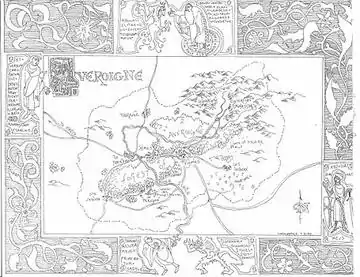Averoigne
Averoigne is a fictional counterpart of a historical province in France, detailed in a series of short stories by the American writer Clark Ashton Smith. Smith may have based Averoigne on the actual province of Auvergne, but its name was probably influenced by the French department of Aveyron, immediately south of Auvergne, due to the similarity in pronunciation. Sixteen of Smith's stories take place in Averoigne.[1] In Smith's fiction, the Southern French province is considered "the most witch-ridden in the entire country."[2] The most well-known citizen is Gaspard du Nord of Vyones, a wizard who translated The Book of Eibon into Norman French.[2]

Fictional history
In ancient times, Smith depicts Averoigne as having been settled by the fictional Gallic tribe called the Averones. They established a number of settlements in the region, many of which were fortified when the Roman Empire absorbed the region. When Christianity spread through the Empire, many churches and monasteries were established among the ruins of Druidic temples. Greatest among these was a great cathedral constructed in Vyones, completed in 1138.
Fictional geography
Averoigne is depicted by Smith as being located in the southern half of France. The northern half of the territory is dominated by the walled city of Vyones, site of an impressive cathedral. In the southern half is located the town of Ximes; the main road of Averoigne runs between Ximes and Vyones, straight through the thick, dark forest that blankets the province. A river called Isoile flows from the mountains in the northern part of the province to feed into a swamp in the south.
Other towns and villages depicted by Smith as being located in Averoigne include: Moulins, Les Hiboux, La Frenâie, Touraine, Sainte Zenobie, and Périgon. In the forest can be found haunted ruins, such as the Château of Fausseflammes and the stronghold of Ylourgne. (It was from that abandoned abode of evil robber barons, that the horrific events of The Colossus of Ylourgne had their start.)
Reception
In 1993, Stefan Dziemianowicz wrote in Dark Eidolon: The Journal of Smith Studies that "The Colossus of Ylourgne, with its series of increasingly bizarre events culminating in the rampage of the most awesome monster to appear in Smith's fiction, comes closest of any of the Averoigne tales to evoking the sense of wonder in Smith's otherworldly fantasies... Smith appears to be saying that even the sorcerors of Averoigne are unable to transcend their flawed humanity."[3]
Bibliography
Smith based the following stories in the Averoigne setting:
- "The End of the Story", by Clark Ashton Smith (Weird Tales, Popular Fiction Publishing Co., May 1930)
- "A Rendezvous in Averoigne", by Clark Ashton Smith (Weird Tales, Popular Fiction Publishing Co., April/May 1931)
- "The Maker of Gargoyles" (synopsis), by Clark Ashton Smith (Weird Tales, Popular Fiction Publishing Co., August 1932)
- "The Mandrakes", by Clark Ashton Smith (Weird Tales, Popular Fiction Publishing Co., February 1933)
- "The Beast of Averoigne" (originally published version), by Clark Ashton Smith (Weird Tales, Popular Fiction Publishing Co., May 1933)
- "The Holiness of Azédarac", by Clark Ashton Smith (Weird Tales, Popular Fiction Publishing Co., November 1933)
- "The Colossus of Ylourgne", by Clark Ashton Smith (Weird Tales, Popular Fiction Publishing Co., June 1934)
- "The Disinterment of Venus" (synopsis), by Clark Ashton Smith (Weird Tales, Popular Fiction Publishing Co., July 1934)
- "Mother of Toads" (originally published version), by Clark Ashton Smith (Weird Tales, Popular Fiction Publishing Co., July 1938)
- "The Enchantress of Sylaire", by Clark Ashton Smith (Weird Tales, Weird Tales, July 1941)
- "The Satyr" (alternate ending), by Clark Ashton Smith (Genius Loci, Arkham House, 1948) – Originally written in 1931.
- "Averoigne" (poetry), by Clark Ashton Smith (Challenge, Spring 1951)
All these stories have recently been collected in the ebook The Averoigne Archives: The Complete Averoigne Tales of Clark Ashton Smith (Pickman's Press, 2019).
Fragments
A number of other Averoigne stories exist in outline form, uncompleted at the time of Smith's death. These include:
Other writers
Other writers have set stories in Averoigne, including:
- "Out of the Aeons", by H.P. Lovecraft (with Hazel Heald), 1933
- "The Butcher of Vyones", by Michael Minnis (The Sorcerer's Apprentices, Sunken Citadel/Tenoka Press, 1998)
- "The Circumstances of Ghostly Cats", by Michael Minnis (Apocalypse Rhythm: The Complete Cthulhu Mythos Tales of Michael Minnis, Volume 1, Lindisfarne Press)
- "Gros Vert", by Michael Minnis (Apocalypse Rhythm: The Complete Cthulhu Mythos Tales of Michael Minnis, Volume 1, Lindisfarne Press)
- "Symposium of the Gargoyle: A Tale of Nineteenth Century Averoigne", by Simon Whitechapel
- "The Passing of Belzévuthe" by Simon Whitechapel
- "Hugh the Discerning" by Garnett Elliott
- "The Doom of Azédarac" "posthumous collaboration" by Ron Hilger
- "The Oracle of Sadoqua" "posthumous collaboration" by Ron Hilger
- The Dungeons & Dragons module X2, Castle Amber, designed by Tom Moldvay, contains numerous references to Averoigne
- In addition, in the novel A Case of Conscience, James Blish includes a character named "Lucien le Comte des Bois d'Averoigne." This name means, "Lucien, the Count of the Woods of Averoigne."
- The Case Study of Vanitas (volume 1) written by Jun Mochizuki in 2016 (Place where Noé, the protagonist, comes from, he evokes this place on page 17)
See also
References
- Bleiler, Richard (2013). "Visionary Star-Treader: The Speculative Writings of Clark Ashton Smith". In Hoppenstand, Gary (ed.). Critical Insights: Pulp Fiction of the '20s and '30s. Salem Press. pp. 68–71. ISBN 9781429838436. Retrieved August 20, 2020.
- Harms, Daniel (1998). Encyclopedia Cthulhiana: A Guide to Lovecraftian Horror (2nd ed.). Chaosium Publications. p. 15. ISBN 1568821190. Retrieved August 20, 2020.
- Bloom, Harold (1995). Modern Fantasy Writers. Chelsea House Publications. p. 163. ISBN 0791022234. Retrieved August 20, 2020.